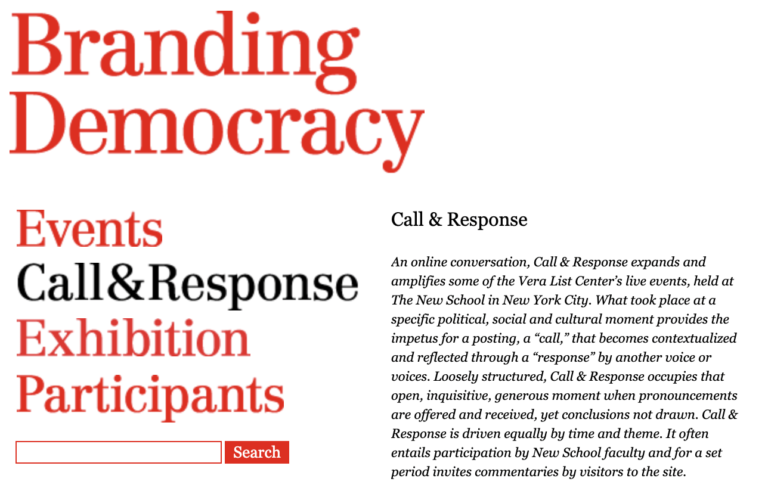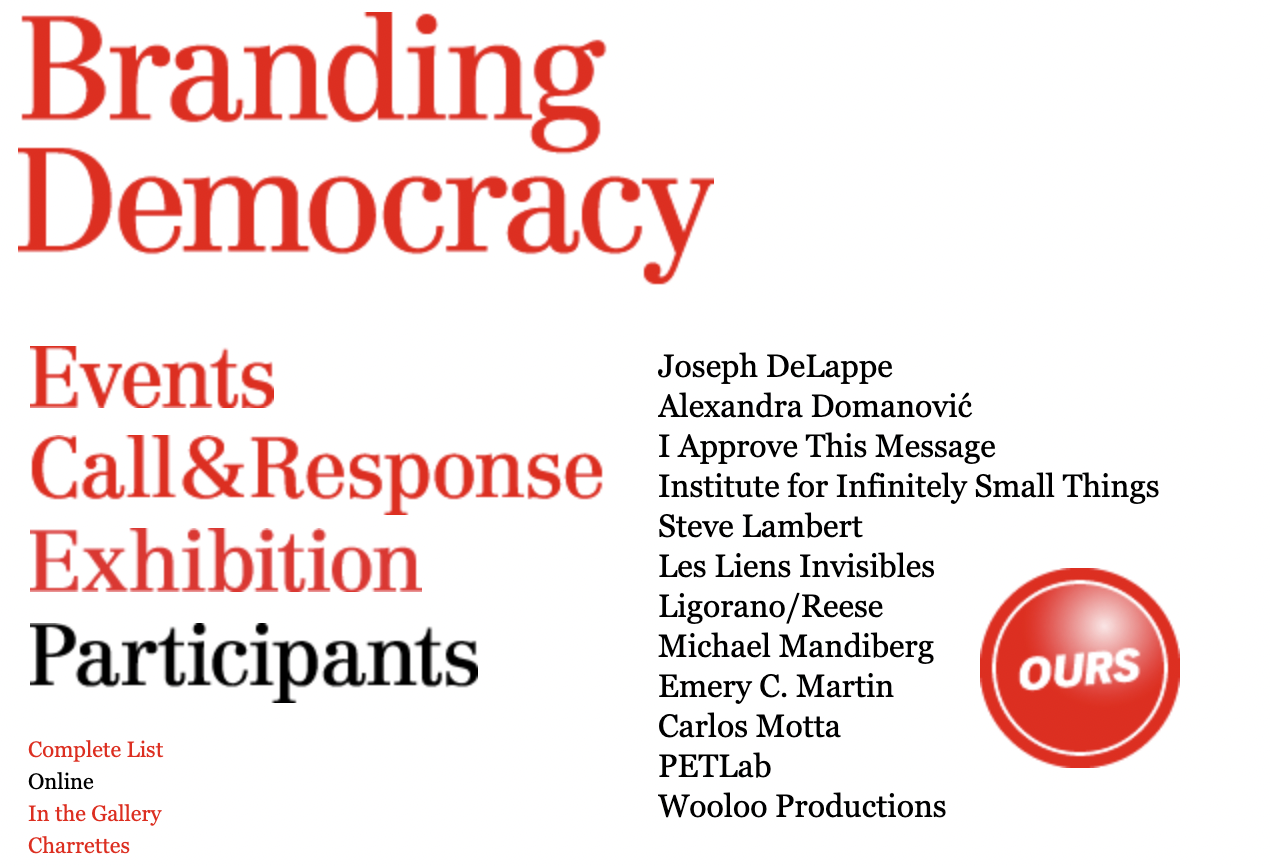
Exhibition
OURS: Democracy in the Age of Branding | Online Works
Online
An interesting paradox informs the online works of OURS. Network culture has given us new challenges to our civil liberties—illegal government surveillance, increased censorship, retrograde copyright enforcement, linguistic hegemony—and, at the same time, provided us with new tools for combating these challenges. The question of branding is a perfect point of entry for such an enterprise. What is branding if not a highly-mediated, visually-based form of communication whose rhetorical and psychological impacts are just as precisely calculated as the military’s psychological operations (PSYOPs)? The Internet makes the “source code” of these missives transparent and editable. Taking this DIY political aesthetic into their own hands, the Web-based works in OURS reflect on contemporary politics—whether it is the state of things in the U.S. or abroad.
Participants:
Joseph DeLappe
Alexandra Domanović
I Approve This Message
Institute for Infinitely Small Things
Steve Lambert
Les Liens Invisibles
Ligorano/Reese
Michael Mandiberg
Emery C. Martin
Carlos Motta
PETLab
Wooloo Productions
Joseph DeLappe

This ongoing memorial takes the form of an intervention in “America’s Army,” the online first-person-shooter video game used by the U.S. Army to recruit new soldiers. DeLappe logged into the game with the user name “dead-in-iraq” and proceeded to use the game’s text messaging system to type the names, ages, divisions, and dates of death of all recently deceased U.S. soldiers in Iraq. Then he waited to be shot by other players, died, and began the process again (after being “reincarnated”). Dead-in-Iraq is a provocative co-opting of the tools of digital culture in order to engage with the political issues raised in an era of high technology propaganda and war.
For More Information — Dead-in-Iraq
DeLappe, Joseph
Born 1963, USA
Lives in Reno, Nevada
I Approve This Message

This participatory project was initiated by the organizers of the UnConvention, an umbrella for art projects and interventions happening in the region of the 2008 Republican National Convention in St. Paul. Sidestepping efforts by authorities to keep voices of dissent or other visual distractions at bay during this quadrennial spectacle, and taking its title from the obligatory statement uttered by candidates at the end of campaign ads, “I Approve This Message” gives the public a chance to address delegates at both conventions. Touted as “a community-generated media response” giving people “a voice and an opportunity to promote thinking about what participating in democracy looks like,” the project revolves around a Web site in which users’ two-minute videos are posted to paint a collective picture of what this process means to them.
For More Information — I Approve This Message
I Approve This Message
Born 2008, USA
Institute for Infinitely Small Things

At once a promotional ad and a speculative performance, Transferring Patriotism is the trailer or placeholder for an exchange in which the artists would—for the cost of their travel expenses—travel to a buyer’s home country and sell their patriotism. The transaction has precise terms and must occur over a table evenly riding the border between the buyers’ nation and the territory of the local American Embassy, around which the respective parties would first sit and consume an American beer. The terms of this contract recall the patriotism-stoking genre of American Westerns in which contention over frontiers entrenched imperialist fantasies.
Institute for Infinitely Small Things
Born 2004, USA
Active in Boston, MA
Steve Lambart

This Web site acts as a scrapbook for public photos uploaded to Flickr and tagged “whytheyhateus.” The site’s call for contributors explains only: “The images on WhyTheyHate.Us fit a theme. If you don’t know what that theme is, please do not add images.” Viewers are thus left to draw conclusions about who “they” and “us” are, as they surf through thousands of images collectively documenting American patriotism, military bravado, homeland-centric rhetoric, naiveté, or blatant consumerism. This framing of the tagged photos raises the question of local culpability for the image we export to other nations and the extent to which Americans “buy into” this image.
LECTURES
Freedom: Do It Yourself
A public conversation between artists Sam Gould and Steven Lambert
Monday, July 20, 2009 – 6:30 to 8:00 p.m.
The New School, 66 West 12th Street, Room 510
Admission: Free
A tricky word, Freedom is usually considered the lodestone of democracy. All too often this concept is found warped, mangled, and spun to benefit those utilizing it for control and usurpation of power for political and monetary gain.
Such is the opinion of artists Sam Gould and Steven Lambert, whose work aims to deconstruct abuses of the concept of Freedom. Using art as a hybrid of collective action, public demonstration, comedy, and the discussion of what America, and the world, could be—if only we were willing to ask questions and be willing to fail—Gould and Lambert’s practice aims to dismantle and flatten perceived notions of power, history, and individual responsibility.
In this public discussion the pair highlight their projects (through groups such as Red76 and the Anti-Advertising Agency) which may often be found borrowing from other models—history, marketing, punk rock, indie rock, entertainment, and appropriation in the age of consumerism. The two also discuss artists and groups who utilize similar models of action and process, in turn mapping a strain of aesthetic practice that is in dialogue with the art world but also strives to adapt its language to engage the broadest audience possible.
Lambert, Steve
Born 1976, USA
Lives in New York
Les Liens Invisibles

This source project “Fake is a Fake” by the Italian collective Les Liens Invisible makes it easy for internet users with access to free Word Press blogging software to mimic high profile sites like news and government agencies, while inserting their own statements. Constantly updated and refined by a group of devoted developers, the list of available spoofs continues to grow while blending art, advertising, and activism. The newest available Web site template, “Peking2008,” used the Olympic games in Beijing as a backdrop for discussing China’s attitude towards human rights. In demonstrating that the ubiquity and recognizability of branded messages make them particularly vulnerable to forms of plagiarism, the site looks just like the Olympics homepage, while addressing issues censored in China.
Les Liens Invisibles
Born 2007, Italy
Wooloo Productions
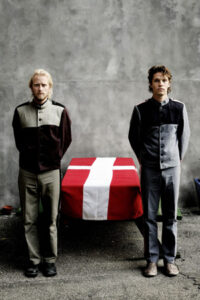
Rebranding Acts is, according to this artists’ collective, “an investigation into cultural identity in an age of global migration.” The initiative uses the online platform wooloo.org to invite artists from around the world to consider the ways in which “nationality” is manufactured in their home country, and to “rebrand” these concepts, from their own perspective. While the open call is predicated on the argument that such hegemonic nationalist constructions often exclude identities that don’t fit the mold, Rebranding Acts invites anyone to add their voice to the discussion by uploading videos of their own public interventions. The project draws on previous interventionist and participatory works by the collective’s founders in which the concept of national identity is revealed to be anything but black-and-white, and the resulting archive documents the myriad ways in which people around the world respond to this problematic notion.
Wooloo Productions
Born 2006, Denmark
Active in Berlin and Copenhagen
Related
Exhibition
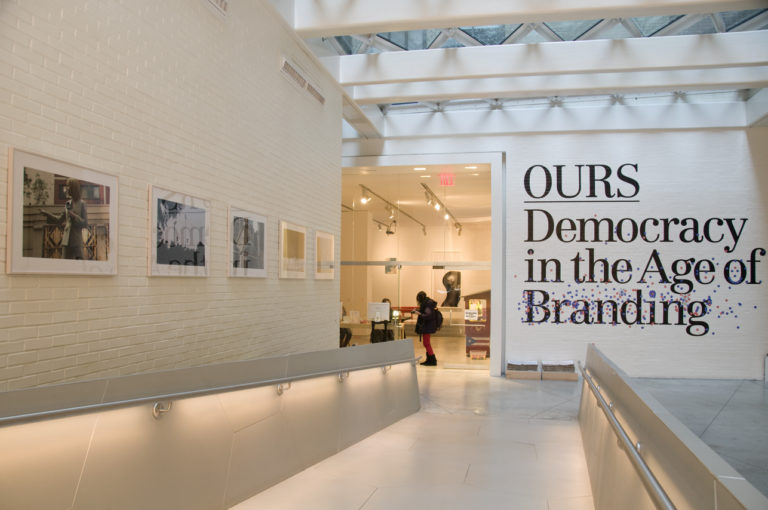
OURS: Democracy in the Age of Branding
Oct 15, 2008
Performance
PETLab, Re:Activism NYC
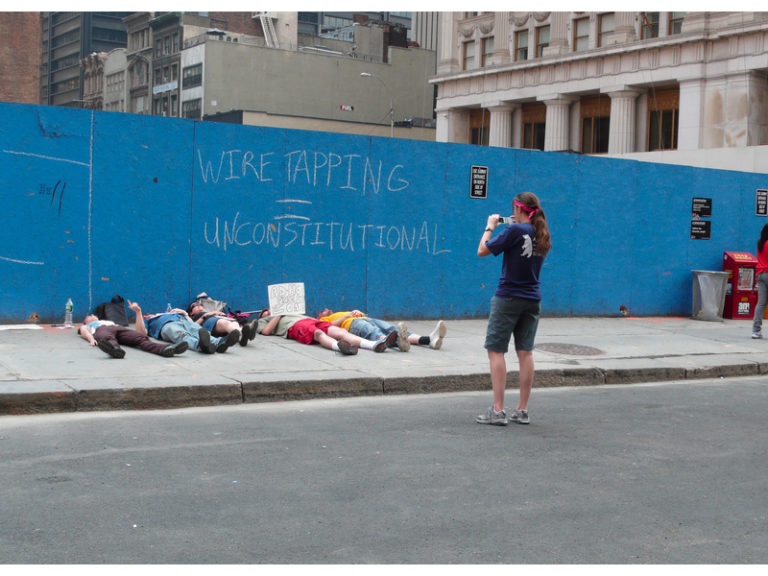
Nov 4, 2008
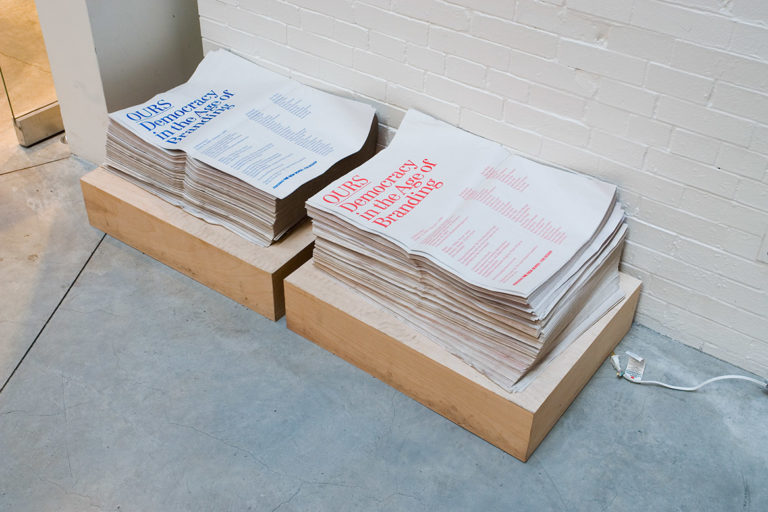
Broadsheet, Catalogue
OURS: Democracy in the Age of Branding
Conversation
CALL & RESPONSE: The Law is Laughing; Fragments Following the War in Gaza
